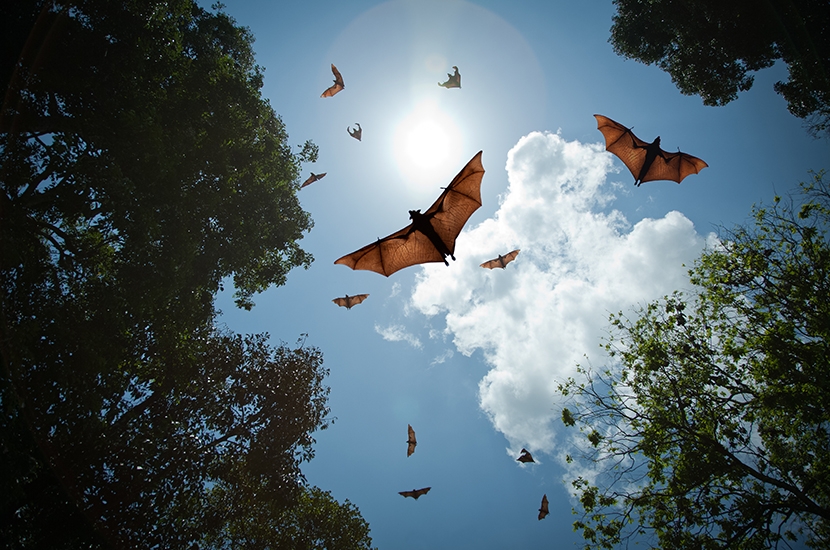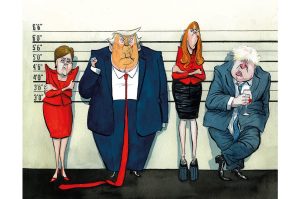There was always one key flaw in our species. Which is that someone always shags a monkey. I have expressed this thought fairly regularly in private, often to friends who don’t get the reference about the likely origin of Aids and look at me strangely ever after. Still, I find it a useful rule. We humans are — perhaps always have been — as weak as our weakest member makes us. And if just one of us chooses of an evening to force themselves on one of our simian cousins, then before long people across the planet start dropping dead.
I suppose the monkey-shagger rule will now have to be updated to take into account the fact that someone will always blend a bat. For however developed or progressive we fancy ourselves, however many mega-cities we manage to build, we will still never have 100 percent certainty that there isn’t someone looking at some scrawny cave-hanger and thinking: ‘What a nice soup he would make.’
To contemplate these odds is to be filled with awe. It seems miraculous enough that our species can survive the stupidity of any one human being. The idea that in order to go on we need to survive the stupidity, gluttony and, I might mention, lustfulness of every human on planet Earth ought to put our chances at somewhere near nought.
Yet here we still are, for one reason alone. Which is that our species also possesses a set of virtues which, with an uncanny precision, sometimes more than adequately makes up for the rest. These virtues may be dwelt upon less often. Perhaps because we are embarrassed by them. Perhaps because we take them for granted, or prefer our performative negation of them. But look at the virtues this country has demonstrated in the past several weeks and you begin to think we might still have a chance against the bat-shaggers.
Throughout recent years we have read (and some of us have written) constantly about the breakdown of trust in our society. One by one the institutions that held the public’s trust were said to have fallen: whether it was the judiciary, police, parliament, monarchy or anything else. Cast your mind back only a few months and we in Britain were said to be living in a ‘divided country’. Even sometimes a ‘failed state’, caught in a crevice between a set of competing sources of power, none of which could command the public’s trust. The British people, even more than others, were said to have become distrustful of all authority, including all varieties of expert.
Yet here we are, at Easter 2020, all cocooned more or less agreeably in our homes, faithfully obeying orders not because we must — like the population of some communist despotism — but because, like citizens in democracies worldwide, we have agreed to do so. If as a result, as seems possible at the time of writing, the angel of death clips its wings on our abode but leaves the structure standing, then there will be plenty of gratitude for us to feel. Among those sources of gratitude should be the fact that during this time we have been reminded, beneath the din, of what we actually rely on, listen to and need.
We listened as Boris Johnson told us to remain in our homes. We responded when he asked us to volunteer. We were concerned when we were told that our National Health Service risked being overwhelmed. We were persuaded when the nation’s top scientists showed us their graphs, became household names and persuaded us to alter our lives.
Some people caviled, of course. They worried that we might have become over–subservient. But that didn’t seem a fair critique, certainly not in this phase. The British public did not do what we were told because we are by nature a pliant, subservient people. We did what we were told because we believed and trusted that a situation could have occurred which would have left our hospitals overwhelmed and taken our country into disaster. We acted to avert the worst of that situation. And if we have managed to do so and end up forgetting that fact then we’ll be the lucky ones.
Whatever happens, there is going to be mending to do. But what strikes me now is how, in a nation alleged to have been so low on trust and respect, we have been quietly storing it away even while we pretended otherwise. When a real problem came, there wasn’t much time for the people with imaginary ones. At no stage was there a demand for grievance studies professors to address the nation. As the virus spread, absolutely nobody called for a press conference of social scientists.
We wanted to hear from politicians clearly trying to do their best. We wanted to hear from medical experts. And finally we wanted to hear from the Queen, who remains the person best placed in our national life — or any nation’s life — to put in context what will hopefully soon recede in the national memory into one of those ugly things that just sometimes happens. Like the smog. Or Scottish nationalism.
I don’t know what we’ll end up taking away from all this. Perhaps a lot of things. A bad financial hit, certainly. And there’ll be other things too. Perhaps there will be a knock to our idea about the inevitability of human progress. But who knows? It’s ugly to use a catastrophe as a metastasizing force for whatever your own political viewpoint happens to be. And of course it is possible that as a society we take nothing away from this. That it’ll just be one of those strange things — like the riots in 2011 — which seemed for a moment to have changed everything, but end up changing nothing.
For my own part I already know one thing I’ll take. Which is admiration. Not just for the people in this country, but for people around the world, who volunteered themselves, sequestered themselves and in some cases sacrificed themselves. Not because they had no choice. But because in a moment of terrible clarity we were all reminded of that simple truth Rilke wrote: ‘Because to be here means so much.’
This article was originally published in
The Spectator’s UK magazine. Subscribe to the US edition here.


















